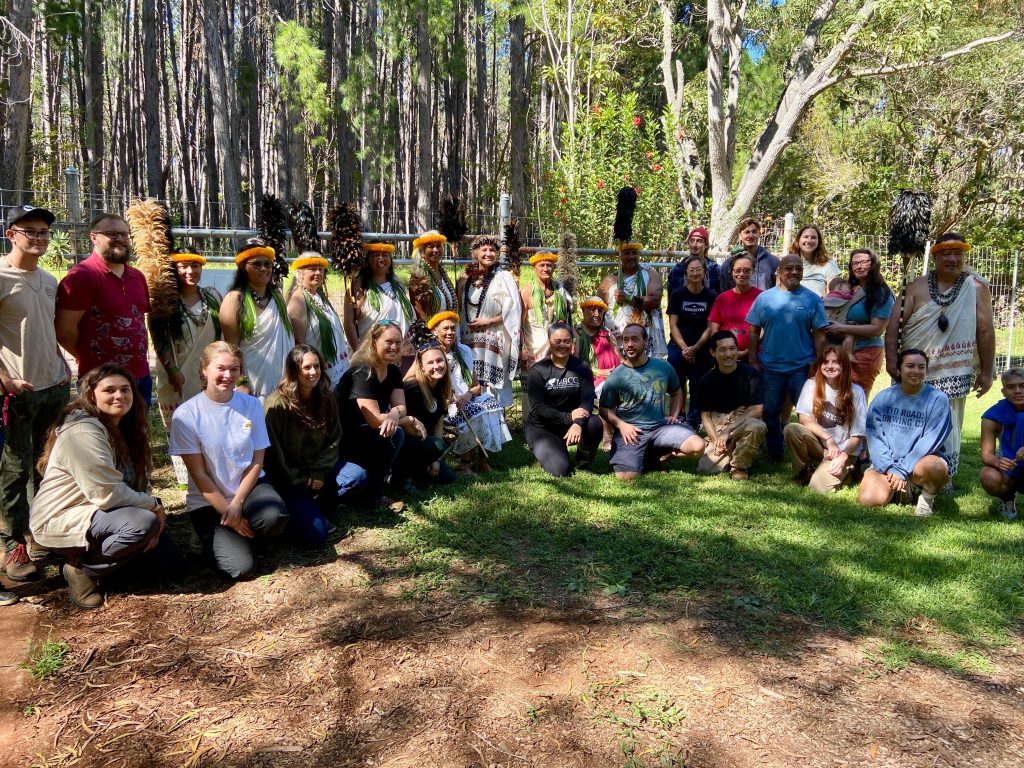10/9/24 – ʻALALĀ BEGIN JOURNEY BACK TO THE WILD ON MAUI
Posted on Oct 9, 2024 in Forestry & Wildlife, Main, News Releases, slider| JOSH GREEN, M.D. GOVERNOR |
DAWN CHANG
CHAIRPERSON |
FOR IMMEDIATE RELEASE
Oct. 9, 2024
ʻALALĀ BEGIN JOURNEY BACK TO THE WILD ON MAUI
Click on photo to view video
(MAKAWAO, MAUI) –In a significant milestone for the conservation of Hawaiʻi’s native birds, five ʻalalā (Native Hawaiian crow) were transferred last week, from the Maui Bird Conservation Center (MBCC) to a temporary field aviary on the slopes of Haleakalā. This marks the beginning of their adaptation period before their eventual release into the wild. MBCC is operated by San Diego Zoo Wildlife Alliance.
The ʻalalā, revered in Hawaiian culture and known for their intelligence, are the only surviving native crow species in Hawaiʻi. They are currently extinct in the wild. The birds will spend three to four weeks in their temporary aviary, carefully monitored by conservation teams, before being released into the Kīpahulu Forest Reserve. The site, on the leeward slopes of Haleakalā, was selected for its native vegetation and relative isolation, key factors in ensuring the birds’ survival.
The pilot release on Maui follows a few years of reintroduction efforts on Hawaiʻi Island, which had both successes and challenges. While those challenges ultimately resulted in the birds being brought back into human care, there were lessons learned and insights gained that will help in the future.
“Even though ʻalalā have been gone from Maui Nui longer than Hawaiʻi Island, we are trying to do an experimental release here to see if we have enough forest for them to survive in and see if maybe this could be a steppingstone to eventually a bigger recovery effort on Hawaiʻi Island,” said Dr. Hanna Mounce, manager of the Maui Forest Bird Recovery Project (MFBRP).
Two females and three males were bred in captivity and have spent the last 10 months in a social group. Conservation teams hope this close bond will help them thrive as they adjust to the forest. “When you put birds in a captive environment, even though you’re trying to give them enrichment and care for them the right way, they are not doing all the things they need to do in the wild. They have to relearn those behaviors that came generations before them,” said Mounce. Each bird is equipped with transmitters to track their movements after release.
Before the birds were transferred to their new home by helicopter, staff from the MBCC and the MFBRP joined local hālau Nā Hanona Kūlike ʻO Piʻilani to conduct an emotional send-off. Its pule honored the ʻalalā as hulu kūpuna and sought to guide them through their journey.
“We were letting them know we need them to be around to thrive. So if they thrive, we all thrive,” Kumu Kaponoʻai Molitau explained. He also acknowledged the significance of the conservationists’ work. “They’re caring for the voice of that ancestor, so that one day we can have many of those voices returned.”
Like the conservationists, Molitau is invested in the long term efforts to restore ʻalalā. “I look forward to coming back in five years and seeing what that those voices sound like. I look forward to future generations here on Maui being a part of this program, so that we can all collectively understand that it is our kuleana, it’s our responsibility, but it’s also a very big honor to be a part of that responsibility.”
In addition to San Diego Zoo Wildlife Alliance, the DLNR Division of Forestry and Wildlife (DOFAW), the U.S. Fish and Wildlife Service, the National Park Service and The Nature Conservancy are active partners in the reintroduction of ʻalalā on Maui.
# # #
RESOURCES
(All images/video courtesy: DLNR)
HD video – ʻAlalā in MBCC aviary and sendoff ceremony (September 26 and October 3, 2024):
https://vimeo.com/manage/videos/1017770469
HD video – Dr. Hanna Mounce and Kumu Kaponoʻai Molitau SOTs (October 3, 2024):
https://vimeo.com/manage/videos/1017762254
Photographs – ʻAlalā in MBCC aviary (September 26, 2024):
Photographs – ʻAlala transfer ceremony (October 3, 2024):
Media Contacts:
Patti Jette
Communications Specialist
Dan Dennison
Communications Director


